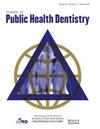Association between cash transfer programs and oral health—A scoping review
Abstract
Objectives
The aims of this scoping review are to assess the literature investigating the association between cash transfer programs and oral health; and to identify the theoretical frameworks applied to guide this literature.
Methods
A search strategy to identify studies published until December 2020 was applied to a range of databases. Observational and interventional studies that had cash transfer programs as exposure/intervention and oral health as outcome were considered. Dental health services utilization, as well as access to dental health services, were considered secondary outcomes. Cash transfer programs were considered programs based on conditional or unconditional cash transfer carried out as part of national social protection schemes, and interventional studies on the impact of cash transfer on oral health were also considered eligible. Data charting was performed in two steps and a narrative synthesis was conducted.
Results
Of 6344 articles identified, four articles were included. These articles investigated three different conditional cash transfer programs, Universal Child Allowance (Argentina), Bolsa Família (Brazil) and Family Rewards (USA). Inconsistencies were identified in findings on the effect of conditional cash transfer programs on the prevalence of dental caries and these differences may be due to the comparison group selected for each study. Concerning dental visits, the results point in different directions, which makes these findings still inconclusive. No explicit theoretical framework was reported in the articles to guide the expected association.
Conclusion
Although cash transfers play an important role in improving certain health outcomes, there is limited evidence to suggest an association between cash transfers and oral health.

 求助内容:
求助内容: 应助结果提醒方式:
应助结果提醒方式:


